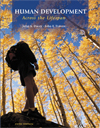 |  Human Development Across the Lifespan, 5/e John S. Dacey,
Boston College
John F. Travers,
Boston College
Late Adulthood Psychosocial Development in Late Adulthood
Learning ObjectivesAfter reading this chapter, the student should be able to complete the following goals:
1Discuss gender roles and gender-role differences in late adulthood. |
 |  |  | 2Discuss sexuality in late adulthood. |
 |  |  | 3Examine the factors contributing to intimacy. |
 |  |  | 4Define generative and existential love. |
 |  |  | 5List the four stages of life that most middle-aged couples go through as they pass through life and the corresponding six types of conflict encountered between parents and their offspring. |
 |  |  | 6Discuss changes that occur as a result of widowhood. |
 |  |  | 7Discuss issues related to the care of elderly parents. |
 |  |  | 8Discuss the changing role of grandparents. |
 |  |  | 9Describe characteristics of the older worker. |
 |  |  | 10Assess the relationship between retirement and leisure. |
 |  |  | 11Summarize the findings of the Committee on Human Development regarding the effects of aging on personal development. |
 |  |  | 12Compare and contrast the three proposed approaches to optimal aging in terms of relationships. |
 |  |  | 13Define Erikson's final stage of human development-integrity versus despair. |
|



 2002 McGraw-Hill Higher Education
2002 McGraw-Hill Higher Education